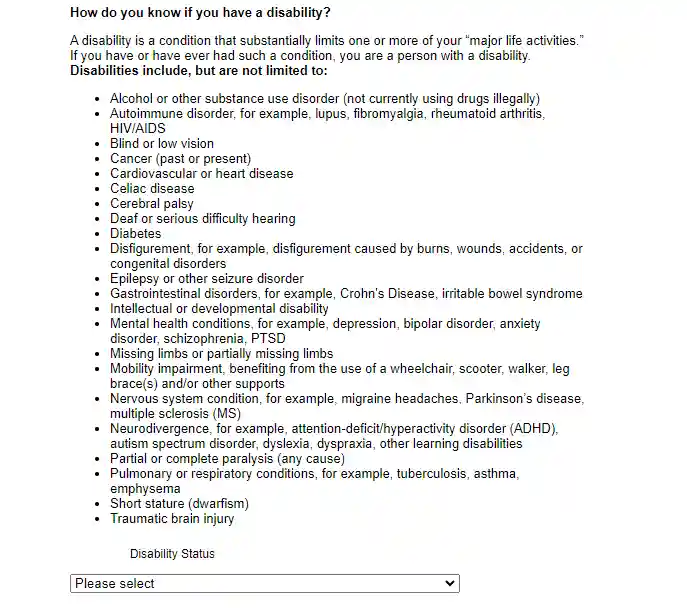Celiac.com 06/15/2024 - In recent years, there has been a notable increase in the number of online job applications that include questions about disability status. At least 50% of these applications now inquire whether applicants have a disability, with celiac disease often listed as a potential disability. This trend raises important questions about the nature of celiac disease and whether it should be classified as a disability on a job application. While recognizing the challenges faced by individuals with celiac disease, it is crucial to critically examine whether it fits the standard definition of a disability, especially considering that adherence to a gluten-free diet typically leads to a symptom-free state.
Understanding Celiac Disease
Celiac disease is an autoimmune disorder where the ingestion of gluten leads to damage in the small intestine. Gluten is a protein found in wheat, barley, and rye. For individuals with celiac disease, even a small amount of gluten can trigger an immune response that damages the villi of the small intestine, leading to nutrient malabsorption and various symptoms, such as gastrointestinal issues, fatigue, and anemia.
The Gluten-Free Diet as a Solution
Celiac.com Sponsor (A12):
The primary treatment for celiac disease is a strict, lifelong gluten-free diet. Adherence to this diet usually results in the healing of the intestinal lining and the resolution of symptoms. Most individuals with celiac disease who follow a gluten-free diet for several months to a couple of years can achieve a symptom-free state and lead normal, healthy lives—without any issues that would interfere with work—especially if the job is remote work (yes, even remote jobs where you would work from home are now asking this question).
Celiac Disease and Disability: Definitions and Implications
The Americans with Disabilities Act (ADA) defines a disability as a physical or mental impairment that substantially limits one or more major life activities. This definition includes conditions that are episodic or in remission if they would substantially limit a major life activity when active. Understanding how the ADA applies to work and jobs is crucial for both employers and employees, as it ensures that individuals with disabilities have equal access to employment opportunities and workplace accommodations.
The ADA prohibits discrimination against qualified individuals with disabilities in all aspects of employment, including hiring, firing, promotions, job assignments, training, benefits, and any other terms, conditions, and privileges of employment. It applies to private employers with 15 or more employees, as well as to state and local government employers, employment agencies, and labor unions. Under the ADA, employers are required to provide reasonable accommodations to qualified employees with disabilities, unless doing so would cause undue hardship to the business.
Reasonable accommodations are modifications or adjustments to a job or work environment that enable a person with a disability to perform essential job functions. Examples of reasonable accommodations include:
- Making existing facilities accessible
- Restructuring a job
- Modifying work schedules
- Acquiring or modifying equipment
- Providing qualified readers or interpreters
For individuals with celiac disease, reasonable accommodations might include ensuring access to gluten-free food options in the workplace, providing flexibility in break times to allow for safe eating practices, or allowing remote work if gluten contamination in the workplace is a concern.
The Case for Skepticism
Symptom-Free State and Normal Functioning
The primary argument against categorizing celiac disease as a standard disability is the fact that individuals with the condition can achieve a symptom-free state through dietary management. Once on a gluten-free diet, the majority of people with celiac disease do not experience limitations in their daily activities or work performance. They are not substantially limited in any major life activity, which is a key criterion for defining a disability under the ADA.
If someone with celiac disease can bring their own food to work, of if they can work from home and fully control their food, it's very unlikely that a worker would ever be considered disabled to the point where it would affect their ability to perform their job.
Comparisons with Other Disabilities
Comparing celiac disease with other disabilities that inherently limit life activities can be illuminating. For example, conditions like multiple sclerosis, Parkinson's disease, or severe mental health disorders often have persistent symptoms and functional impairments despite treatment. In contrast, celiac disease, when managed with diet, does not typically present ongoing challenges or impairments that affect daily functioning.
The Impact of Labeling Celiac Disease as a Disability
Potential Benefits
There are potential benefits to recognizing celiac disease as a disability. It can ensure that individuals with the condition receive necessary accommodations, such as access to gluten-free food options at work or understanding from employers regarding their dietary needs. It can also provide legal protections against discrimination.
Potential Drawbacks
However, labeling celiac disease as a disability can also have drawbacks. It may lead to unnecessary stigmatization or misconceptions about the capabilities of individuals with the condition. Employers might mistakenly believe that people with celiac disease require significant accommodations or are frequently ill, which is not the case for those adhering to a gluten-free diet. This could inadvertently affect hiring decisions and job opportunities.
Navigating Job Applications
Transparency and Honesty
When faced with the question of disability status on job applications, individuals with celiac disease must navigate a complex landscape. Honesty is paramount, but so is understanding the implications of disclosing a condition that, when managed, does not cause substantial limitations. If someone with celiac disease has been symptom-free for a considerable period due to a strict gluten-free diet, they may not feel the need to disclose their condition as a disability.

Caption: An actual job application—how would you answer?
Legal Considerations
Legally, it can be permissible for individuals with well-managed celiac disease to answer "no" to the disability question if their condition does not currently limit any major life activities. The ADA defines a disability based on the presence of substantial limitations, and if those limitations are effectively mitigated through diet, an individual may reasonably determine that they do not meet this criteria. However, it's important to note that the ADA also considers conditions that are episodic or in remission, meaning that if the person were to consume gluten, their major life activities would be substantially limited. Thus, while saying "no" can be legally justifiable, it is crucial for individuals to consider their specific circumstances and the potential need for future accommodations when making this decision. Consulting with a legal or HR expert can provide additional clarity and ensure compliance with ADA guidelines.
Rethinking Disability Categories
Criteria for Disability
The inclusion of celiac disease in disability categories invites a broader discussion about what constitutes a disability. The criteria should focus on the extent to which a condition limits major life activities despite management or treatment. If a condition can be effectively managed to the point where it no longer imposes substantial limitations, its classification as a disability should be reconsidered.
Individualized Assessments
Rather than blanket classifications, individualized assessments might offer a more nuanced approach. Evaluating the specific circumstances and needs of each person with celiac disease can ensure that those who genuinely require accommodations receive them, while those who do not are not unnecessarily labeled.
Conclusion
The increasing inclusion of celiac disease in disability categories on job applications warrants critical examination. While it is crucial to protect the rights and accommodate the needs of individuals with celiac disease, it is equally important to recognize that effective dietary management typically leads to a symptom-free and fully functional state. Classifying celiac disease as a disability for all individuals may not reflect the reality of those who have successfully managed their condition through a gluten-free diet. A more nuanced, individualized approach to disability classification and disclosure may better serve the interests of both job applicants and employers, fostering a more accurate understanding of celiac disease in the workplace.










Recommended Comments
Create an account or sign in to comment
You need to be a member in order to leave a comment
Create an account
Sign up for a new account in our community. It's easy!
Register a new accountSign in
Already have an account? Sign in here.
Sign In Now